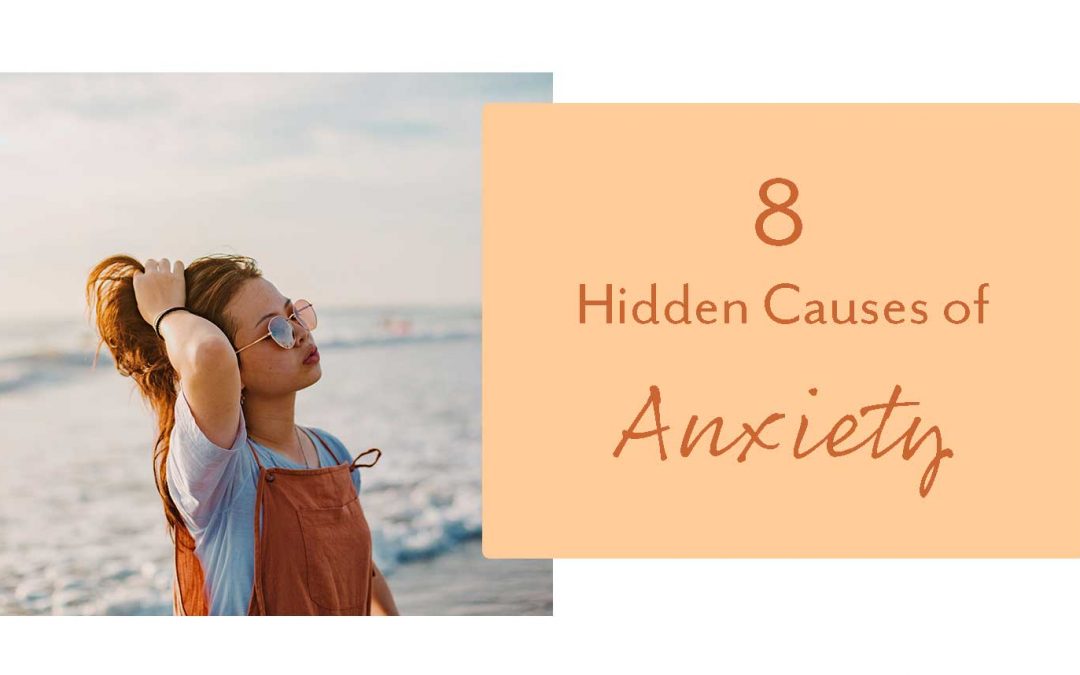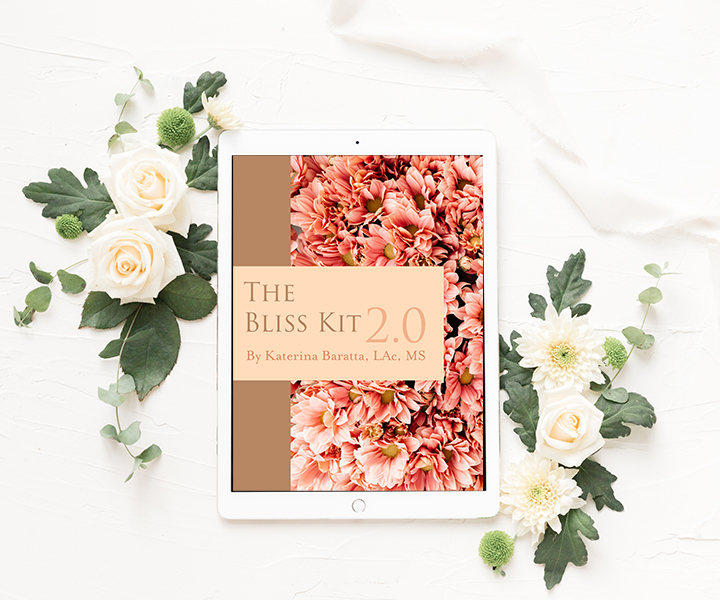8 Hidden Causes of Anxiety
You might think it’s all in your head.
But there are at least 8 hidden causes of anxiety that you want to consider if you’re feeling anxious.
And they have just as much to do with your body and spirit as they do with your thoughts.
Because more often than not, anxiety isn’t about what you think it is.
Whether it’s a deficiency in your body or disconnection with your Life’s Purpose, there’s almost always something deeper going on that needs to be addressed.
Sure, anxiety meds might take the edge off.
But they don’t get to the root of the issue.
And uncomfortable symptoms will keep popping up for you until the root of your anxiety is addressed.
Once you know where to look, you can start to heal the root cause of your anxiety so it doesn’t overwhelm you anymore.
And there’s a good chance that other uncomfortable symptoms you have will go away right along with your anxiety.
Here are 8 hidden causes of anxiety to look at:
1. Poor Sleep
When a baby cries or a toddler has a tantrum, parents go through a checklist of basic needs to see what might be triggering those tears.
Are they hungry?
Do they feel too hot or cold?
Could they be thirsty?
Are they overstimulated?
Do they need some fresh air and movement?
Or maybe they’re just tired?
It’s funny that these basic needs are so obvious to us when we look at our kids, but we often forget about them completely when it comes to our own wellbeing.
But we need all of these things just as much as our little ones.
And sleep is one of the first places I see issues pop up for the women I work with.
When it comes to sleep and anxiety you can get stuck in a catch-22.
Because poor sleep quality has been shown to significantly increase anxiety and other mood issues. (1)
But if you have a tendency to feel anxious, there’s a good chance that you find yourself ruminating at night.
Anxiety can make it hard to fall asleep.
And as anyone who’s gotten the jitters before a big test can tell you, it can make sleep restless.
But getting enough good quality sleep is a crucial step to healing anxiety.
So if you have trouble with insomnia, check out this article on natural strategies you can use to improve your sleep quality.
2. Digestive Issues
Nutrients are the building blocks of your body.
And if you’re deficient in specific nutrients, you’re more likely to feel anxious.
For example, studies have shown a clear association between deficiencies in thiamine (vitamin B1), pyridoxine (vitamin B6), Inositol, vitamin D, magnesium, zinc, selenium, and iron with the likelihood of anxiety. (2, 3, 4)
But you can eat the best diet in the world and still be deficient in key nutrients.
This comes down to a couple of factors, including soil quality and your gut health.
Depleted soil quality is a real problem in conventionally raised foods.
But even organic food falls short of the nutrient-bang you want unless you’re getting your ingredients directly from farmers who practice regenerative agriculture. (5, 6, 7)
So don’t just assume you’re getting all the nutrients you need from your food.
If you have anxiety, you might want to consider talking to your health-care provider about nutrient testing to see if you’re deficient in any essential nutrients.

Another reason you might not be getting the nutrients you need is that your gut isn’t processing your food properly.
If your body can’t break down and absorb the nutrients you’re feeding it, it’s like you’re putting the best quality gas into a car with a broken engine.
And anxiety is one of the main symptoms that pops up when something is up with your gut.
Which is why I always put gut-health strategies at the top of my list of recommendations for new patients.
If you’re dealing with anxiety, you should make gut-health your priority, too.
3. Dehydration
Believe it or not, dehydration can also contribute to anxiety.
Most people don’t realize it, but by the time you notice that you’re thirsty you’re already dehydrated. (8)
Adding structure and electrolytes to your water with cucumbers, chia seeds, honey, or salt can improve your body’s ability to absorb water so you’re less likely to get dehydrated.
4. Food Sensitivity and Inflammation
Food sensitivities can also contribute to anxiety.
Simply put, if your body has trouble processing a specific food it’s can lead to inflammation.
This inflammation is going to send your brain distress signals.
And this distress can cause feelings of anxiety in you. (9, 10)
Your mind will make up stories to try to explain away the bad feelings you’re having, but in reality it might just come down to some of the foods that you’re eating.
While each person is different, and reactions can change throughout your lifetime, there are some foods that are more likely to cause inflammation and anxiety than others.
These include refined sugar, refined grains, alcohol, caffeine, eggs, soy, dairy (especially from cow milk), peanuts, shellfish, nightshades, and citrus fruits.
But you’re unique.
And your body responds to foods in unique ways.
You won’t know which foods trigger you until you experiment with elimination and systematic reintroduction.
So if you have a tendency toward anxiety, it’s a good idea to work with a natural health practitioner to identify food sensitivities that might be increasing inflammation in your system.
Another thing to think about is increasing the amount of anti-inflammatory foods you include in your diet.
Because what you eat has an even bigger impact on your well-being than what you don’t eat.
5. Hormone Imbalance
Hormones are your body’s chemical messengers.
And your hormone balance has a huge impact on how you feel day in and day out.
If you tend to feel more anxious around your menstrual cycle or at specific times of the day, then I’d bet you my lunch there’s something going on with your hormones (and I love my lunch, so I won’t give it up easily).
Regulating your circadian rhythm is a great place to start.
And one way to do this is to go to eat and sleep on a regular schedule.
Medicinal herbs and specific nutrients can also help regulate your hormones.
If you think that you have a hormone imbalance, set up an appointment to get a personalized herbal formula and wellness plan to help get you back on track.
And thyroid function has also been shown to affect anxiety levels. (11)
So if you haven’t had your thyroid tested recently, it’s a good idea to ask your healthcare provider to run that for you as well.
6. Chronic Stress
One of the biggest triggers for hormonal imbalance and anxiety is chronic stress.
In small doses, stress can actually be a good thing.
Small bursts of stress can increase energy levels, improve alertness, and even elevate your mood. (12)
But problems start to show up when you experience higher levels of stress on a regular basis, as many of us do.
Regular and especially unpredictable exposure to stress has been shown to lead to anxiety even when the stressful stimulus is long gone. (13)
This basically means that your body gets into the habit of being on alert and forgets how to relax and enjoy life.
So if you want to relieve anxiety, one of the most important things you can do for yourself is to practice proven stress-management strategies on a regular basis.
7. Environmental Toxins
Exposure to toxins like pesticides, heavy metals, and mold have all been linked with elevated anxiety. (14, 15, 16)
Basically, toxins in your environment get in the way of your body’s ability to function properly.
And as we’ve already discussed, when your body can’t function properly it sends you distress signals to get your attention.
The problem is, our mind often interprets these distress signals inaccurately.
You might think that your anxiety is being triggered by your upcoming Thanksgiving dinner at Great Aunt Sally’s house, when really you’d be able to handle it if your body were clear of all that gunk it’s been exposed to.
It’s definitely a good idea to study up on potential environmental toxins and clear your food and home of anything you can that might be causing problems for you.
One of my favorite resources is the Environmental Working Group, where you can research the safety of products, tap water, and so much more.
8. Spiritual Disconnection
And finally, one of the biggest causes of anxiety in the modern world is spiritual disconnection.
This can come in many forms.
Being overly focused on material things instead of seeing the magic that flows through It All is one issue.
Following a religion that doesn’t match up to your Internal Knowing is another one I see a lot.
Pursuing a career that isn’t part of your Greater Purpose because other people think it’s a good idea is also a really common trigger for anxiety.
If any of these ring true for you, then it’s time to do some serious soul searching.
Seek out wise people.
Read books on life’s biggest mysteries.
Dare to put your own needs and desires before anyone else’s and see what happens.
Because once you’ve aligned with Who You Really Are, you’ll have nothing left to feel anxious about.
References:
- https://academic.oup.com/sleep/article/36/7/1059/2453875
- https://www.ncbi.nlm.nih.gov/pmc/articles/PMC3046018/
- https://www.ncbi.nlm.nih.gov/pmc/articles/PMC4253901/
- https://www.ncbi.nlm.nih.gov/pmc/articles/PMC6390422/
- https://www.organicconsumers.org/essays/regenerative-agriculture-sowing-health-sustainability-and-climate-stability
- https://www.ncbi.nlm.nih.gov/pubmed/15637215
- https://www.scientificamerican.com/article/soil-depletion-and-nutrition-loss/
- https://www.ncbi.nlm.nih.gov/pmc/articles/PMC3984246/
- https://www.sciencedirect.com/science/article/abs/pii/S0021915005003801
- https://www.sciencedirect.com/science/article/pii/S0306453013000073
- https://www.ncbi.nlm.nih.gov/pmc/articles/PMC4911835/
- https://www.ncbi.nlm.nih.gov/pmc/articles/PMC4868668/
- https://www.ncbi.nlm.nih.gov/pmc/articles/PMC1931411/
- http://www.jchr.org/article_544139.html
- https://www.sciencedirect.com/science/article/abs/pii/S0300483X0200728X
- https://www.psychologytoday.com/us/blog/holistic-psychiatry/201708/mold-toxicity-common-cause-psychiatric-symptoms





